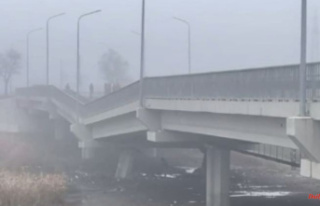Almost nothing in Odessa hints at the upcoming holidays. People have to see how they can cope with the blackouts that last for days. The Ukrainian German teacher Karina Beigelzimer explains how it works.
Christmas is not an issue in Odessa this year. There are hardly any Christmas markets, fairy lights, or decorated shops. Just like there is no Christmas spirit. The Russians stole Christmas from us. At least a few days ago, the city opened the residence of St. Nicholas to the children. Here the little ones can write letters to St. Nicholas, but also to the soldiers at the front or to children in liberated cities. Who knows, maybe something will be organized at least for them on December 25th and January 7th - after all, we celebrate the Catholic and the Orthodox festival. We will see.
At the moment we have completely different concerns. Again and again we are without electricity and without water. We've just come out of a three-day blackout. A friend gifted me a string of LED lights a few days ago, which are usually for the Christmas tree but are now used simply for lighting. I can also count myself lucky because the heating works for me, while many of my friends don't have it either. That's bitter, because it's getting cold in the meantime.
Power outages don't always last several days, but they happen frequently. Now, for example, it's half past eight in the evening and we haven't had any light since ten in the morning. Good thing I charged the computer last night and was able to teach this morning. Who knows if we'll get electricity again today.
When we are without electricity and it gets dark, we use candles and rechargeable flashlights. In the event of a day-long blackout, however, the batteries in the lights and even those in good power banks will eventually run out. Elderly people suffer especially, many are unfamiliar with these storage devices and they are not affordable for everyone.
We are currently living in a mode in which we alternately accelerate and decelerate. As soon as there is electricity, we charge all devices - computers, cell phones, flashlights, power banks. You wash and dry your hair quickly, turn on the washing machine, iron and try to do the most important things in a hurry.
Then when the blackout comes, we switch gears and slow down. For example, don't check your cell phone every half hour to know what's happening in the country and the world, but only every two hours so that the battery lasts longer. Surfing the web is then only possible via the mobile connection. I sometimes teach through this connection. But if the mobile network also fails, you really have the feeling of being completely cut off.
This is a situation that was really difficult for a lot of people in the beginning. Now you try to calm down, distract yourself, read a book or, if you have children, invent new games for them, friends recently told me.
Luckily there is a lot of solidarity. Here is an example: Hospitals are part of the critical infrastructure and must therefore always have electricity. The houses in their immediate vicinity can benefit from this. That's why the residents of these houses keep posting messages on Facebook and Instagram like: "Anyone who wants can come to us and charge their cell phone." Others, who still have a heater, invite you to warm up and drink something warm with them.
And then there are the shops. Fortunately, every third now has a power generator. If they didn't, they would have to close. Cell phones can also be charged there. Although there are many, queues keep forming. It also happened to me that I had to walk around town for a while before I found a charging station. Sometimes I go to the café next to my house. Unfortunately, there is no internet, but at least I can work there a little. The only problem with the generators is that they make a hell of a noise that takes over the whole city.
Of course people are frustrated. We still try not to give up, to keep the humor. Popular sayings now include: "We are the land of the generators, our neighbor is the land of the degenerates," and "We are without electricity, but also without invaders." Of course, this is not normal life, it is rather a struggle for survival. But that's how it is now.












